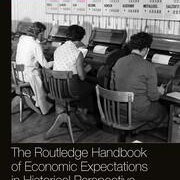
Thomas Hintermaier
@T_Hintermaier
Followers
501
Following
4K
Media
9
Statuses
117
Sure 1. Confidence crashes and animal spirits https://t.co/dYhto2pCZd 2. Old Keynesian Economics https://t.co/uhyh8EO8lR 3. Aggregate Demand and Supply https://t.co/DWq64uqlu8 4. Animal Spirits, Financial Crises and Persistent Unemployment https://t.co/16w1zjlnjb 5. The
@farmerrf @heterodox_econs could you link the papers on the continuum of unemployment equilibria?
0
6
47
New handbook chapter with Zeno Enders & Gernot Müller: “On FIRE, News, and Expectations” – we revisit evidence on full-information rational expectations and discuss alternative expectation-formation models. Open access:
taylorfrancis.com
The full-information rational expectations (FIRE) assumption is at the core of modern macroeconomics. This chapter revisits recent evidence which relates
1
10
37
Questions that involve the future tense (especially in early parts of a talk), e.g. "Are you going to assume that ...?", "Will this depend on ...?". This is sometimes triggered by excessive "preview slides". Solution: Questions that involve the future tense should be taxed.
0
2
7
Thank you Jon @JonSteinsson for this detailed response. We agree about all three of your statements although they are not all of the same ontological category. Point 1 comes closest to a theoretical component of a research program. Points 2 and 3 are falsifiable statements but
I have to say that I do not think of the three tenets Roger mentions as the "hard core of the NK program". To me, the core issues are empirical: 1) the Great Depression was not a Great Vacation. 2) Monetary policy has real effects. 3) Demand shocks seem to have sizable effects on
1
7
54
"Alright then, the data show sticky prices and the NK model has sticky prices. So what is there to argue? In fact, something very important: Do not confuse *measurement* with *theory*." [*italics*] A key observation by @dandolfa in his older blog post, linked in his tweet below.
@carlos_ed_sg The labor market is a relational market. The spot wage (esp. nominal) is not allocative. https://t.co/4QCsa6NxmO Moreover, in NK models, sticky wages are a problem. In Keynes 1936, they are a solution to a problem.
1
0
3
(Zitat fortgesetzt) "von Leuten, die sich in viel höherm Maß aus den Tiefen rekrutieren als viele unter uns wahrhaben wollen." S. 239, Theorie der wirtschaftlichen Entwicklung, 2., neubearbeitete Auflage, Duncker & Humblot, 1926 /N
0
0
0
Zitat auf Deutsch: "Allein die Oberschichten der Gesellschaft gleichen Gasthöfen, die zwar immer voll von Leuten sind, aber von immer andern - " /3
1
0
0
(quote continued) "They consist of persons who are recruited from below to a much greater extent than many of us are willing to admit." p. 156, The Theory of Economic Development, translated from the German by Redvers Opie, Harvard University Press 1934, 3rd printing 1949. /2
1
0
0
The nice illustration used by @NobelPrize below is reminiscent of a comparison made by Joseph Schumpeter in his Theory of Economic Development: "In fact, the upper strata of society are like hotels which are indeed always full of people, but people who are forever changing." /1
Learn more about this year’s prize in economic sciences Press release: https://t.co/LtSdSvg2Gl Popular information: https://t.co/ZaJAaoyVi1 Advanced information: https://t.co/XPptjgy7xC
1
2
3
Robert Lucas formalized the idea of constant flux as a stationary probability measure. That concept is completely consistent with the Austrian notion of constant random change in preferences, endowments and technology and once one recognizes that rational expectations equilibria
No proper student of Austrian economics believes that "equilibrium is the normal state of a free market system." The normal state of a free market: CONSTANT FLUX, from constant change in consumer preferences, resource availability (including labor) & persistent entrepreneurship.
6
19
163
New CEPR Discussion Paper - DP20695 The impact of interest: Firms' investment sensitivity to interest rates Lea Best @ifo_Institut @LMU_Muenchen, @bornecon @UniBonn, @ManuelMenkhoff @uni_copenhagen @UCPH_Research
https://t.co/bMggchkj5H
#CEPR_IMF #CEPR_MEF #EconTwitter
2
4
8
Learning to code and simulate quantitative models is essential (it's the best way to check your analytics).
3
4
91
Two cranes and two macroeconomists. Surprised to "encounter" @christianbaye13 when walking through Hofgarten, Bonn.
0
1
43
Happy to have spoken at the #ECB Watchers conference in Frankfurt today about the implications of #government #debt #expansion for @ecb monetary policy strategy, together with 🇫🇷Governor Villeroy de Galhau, S. Tenreyro & @RefetGurkaynak: My slides here:
1
5
17
Connect to MATLAB from your iPhone, iPad, or Android device with MATLAB Mobile
22
74
453
Our analysis is informed by micro data from the Eurosystem Household Finance and Consumption Survey (HFCS). @ECB_Research @Isabel_Schnabel Link to paper: https://t.co/QalY96CQ2w N/N
econometricsociety.org
0
0
4
we find considerable cross-country asymmetries in consumption responses to interest rate changes, which we link to the differences in household wealth and its composition. 🧵 3/N
1
0
3
life-cycle consumption decisions in a framework that allows for endogenous home ownership (vs. renting) and a continuum of housing values. Applying the model to the four biggest euro-area economies, Germany, France, Italy, Spain, 🧵 2/N
1
0
0
Very happy that joint work with my great coauthor Winfried @KoenigerW was published in the November issue of QE . Punchline: The short-run dynamics of home ownership (vs. renting) are as endogenous to monetary policy as the households' consumption responses . We model 🧵 1/N
1
3
31
"Why Nations Fail ... in the Nations League" seems to get extraordinary media attention these days.
0
1
5













